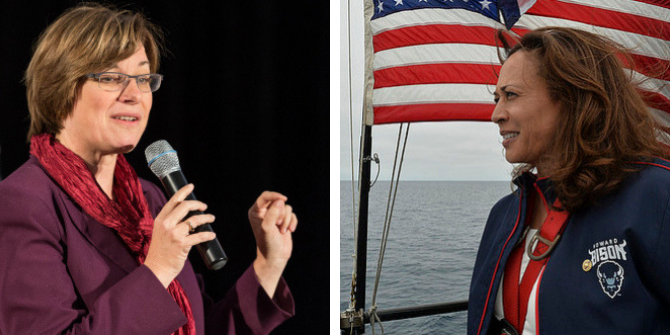 Deliberative democracy has long been an aspiration for campaigners and academics who see it as a way of harnessing humanity’s inherent capacity for reason and debate. But, while compelling in theory, there is a relative paucity of practical evidence as to its success. Here, the former U.S. Health, Education and Welfare David Matthews shares evidence from a 35 year experiment in the form of National issues Forums, evidence which he argues shows that public deliberation depends on a process of constant learning, and that deliberation itself is a form of learning.
Deliberative democracy has long been an aspiration for campaigners and academics who see it as a way of harnessing humanity’s inherent capacity for reason and debate. But, while compelling in theory, there is a relative paucity of practical evidence as to its success. Here, the former U.S. Health, Education and Welfare David Matthews shares evidence from a 35 year experiment in the form of National issues Forums, evidence which he argues shows that public deliberation depends on a process of constant learning, and that deliberation itself is a form of learning.
In the late 1970s in America, a small group of academics and former government officials began an initiative that led to the creation of a network of National Issues Forums (NIF) in 1981. Speech communication scholars contributed to this venture from the beginning. NIF forums promote public deliberation on major nationwide issues and are organized, conducted, and funded by a host of civic, educational, and religious organizations throughout the United States. There are variations of these forums in other countries.
Deliberative forums are one response to people who feel marginalized by the political system yet want to make a difference. Public deliberation creates opportunities for people to do things that they can’t do in a polling place. For example, NIF deliberations allow people to name problems in their own terms and frame issues to identify more than the usual two opposing options for action. They can also set in motion civic actions that are mutually reinforcing. The NIF experiment is intended to help people to get off the sidelines and take a stronger hand in shaping their future.
Many sponsors of National Issues Forums believe implicitly that democracy, or self-rule, depends on the joint work that citizens do to solve common problems. This work requires people to make decisions together about the work they are willing to do. And in order for the decisions to be sound, they should be made deliberatively.
NIF-style deliberation is based on the assumption that the greatest challenge in collective decision making is dealing with the tensions that result when many of the things people hold dear are brought into conflict by the necessity to act together on a problem. The hardest choices are about what should be done rather than what can be done. The tensions, however, don’t seem to be the result of people having vastly different notions of what “should be.” For instance, most everyone values being free from coercion and protected from danger. Yet, in a given situation, what protects us may also curtail our personal freedoms. We have difficult choices to make that require weighing possible courses of action or options against the various things we hold dear. That weighing is what is meant by deliberation in the NIF experiment.

While this “choice work” is demanding, there is evidence that deliberation is a naturally occurring phenomenon that makes use of the human faculty for judgement. Public deliberation’s gradual impact is evident in the maturing of people’s attitudes over time. So the mission of the NIF forums hasn’t been to introduce deliberation as though it were something foreign, but rather to distinguish choice work from other legitimate forms of public discourse and to encourage it wherever collective decisions are made.
Although deliberation has been recognized for so long that it is depicted in Egyptian hieroglyphics, those involved in the NIF experiment quickly learned that the importance of what they were doing was open to challenge. Public deliberation was often discounted as “just talk,” divorced from action. But, for most people, the outcomes of forums had to be useful in solving problems in order to be taken seriously, which is why deliberative public decision making has come to be seen as an integral part of public acting, not something separate from it.
Citizens’ deliberations involve more than deciding “yes” or “no” as in a jury trial. They are integral to ways of working together that allow people to exercise a stronger hand in moulding their future. More and more in the NIF network, deliberation has been viewed as a doorway into a broader understanding of democracy and the role of citizens.
Even though NIF participants don’t usually try to reach a unanimous decision in favor of one particular solution to a problem, they are usually able to lay out a broad direction for moving forward on issues that can only be dealt with by a range of civic initiatives. And the forums proved to be a counterforce to polarization on highly contentious issues like how voting district boundaries should be set or where new schools ought to be located. These deliberations have also been used to influence individual behaviors such as when alcohol has been abused on college campuses or when a lack of examinations increases breast cancer rates.
Some in the NIF network have tried sharing what happens in their forums with elected and appointed officials. Officeholders are often puzzled by what comes out of public deliberation because it isn’t data like polls or focus groups provide. Still, while public deliberation doesn’t necessarily result in specific instructions for officials, it can identify what the citizenry will and won’t accept to solve a problem. It’s a window into how the public thinks when confronted with hard choices.
Looking back, I would say that the most powerful insight from this ongoing experiment has been the recognition that democracy depends on constant learning and that deliberation is a form of learning. In rejecting the authority of sole rulers, democracy came to depend on the citizenry’s collective learning to decide what should be done in the body politic. The ancient Greeks recognized this connection when they described deliberation (logis/phronesis) as a means of teaching themselves.
Deliberating instructs people in the inevitable tensions that arise in decision making because it is never possible to realize everything we hold dear without making painful trade-offs. And as deciding moves into implementing, deliberation helps people recognize their own resources and shared purposes, which fosters mutual reinforcement among different civic initiatives. People have opportunities to learn through everything that goes on in choice work. No wonder a deliberative pedagogy has grown up around the use of deliberation in classrooms. The understanding of democracy that public deliberation brings with it is redesigning civic education.
This article originally appeared at the Democratic Audit of the UK blog.
Featured image credit: Mike Hiatt (Creative Commons BY NC SA)
Please read our comments policy before commenting.
Note: This article gives the views of the author, and not the position of USApp– American Politics and Policy, nor of the London School of Economics.
Shortened URL for this post: http://bit.ly/1s7ddEJ
______________________
David Mathews – Kettering Foundation
David Mathews is president of the Kettering Foundation, a nonprofit research foundation rooted in the American tradition of invention. Prior to his work with the foundation, Mathews was president of the University of Alabama from 1969 to 1980 and served as Secretary of Health, Education, and Welfare in the Ford administration. He received his Ph.D. from Columbia University and has written extensively on Southern history, public policy, education, and international problem solving. His most recent book is The Ecology of Democracy: Finding Ways to Have a Stronger Hand in Shaping Our Future (Kettering Foundation Press, 2014).







A very interesting insight into the National Issues Forums. As someone active in encouraging public deliberations in the UK, I recognise many of the challenges and the benefits that deliberation can offer. In the UK our ‘experiment’ over the last 10 years has been to encourage those involved in Government policy involving science and technology to deliberate with the public on the key emerging areas of science. It has been a learning curve for all involved, but we now have an increasing evidence base on how understanding the views and values of the public contributes to the development of better policy. More on deliberation experience in the UK can be found at http://www.sciencewise-erc.org.uk.